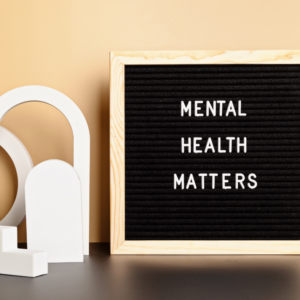Mental Health Matters
 On a recent episode of “Archetypes” podcast, Meghan Markle, Duchess of Sussex, wife to Prince Harry, former actor, and mother of two, deconstructs the label of “crazy.” Meghan, who has been open with her struggles since marrying into the British royal family, talks about seeking help after the lowest point in her life when, at one moment, she “didn’t want to be alive anymore.” And she isn’t alone in feeling that way.
On a recent episode of “Archetypes” podcast, Meghan Markle, Duchess of Sussex, wife to Prince Harry, former actor, and mother of two, deconstructs the label of “crazy.” Meghan, who has been open with her struggles since marrying into the British royal family, talks about seeking help after the lowest point in her life when, at one moment, she “didn’t want to be alive anymore.” And she isn’t alone in feeling that way.
One in five adults experience mental illness in the United States with one in 20 experiencing mental illness that interferes with daily life and function. Moreover, 1 in 15 adults experience both a substance use disorder and mental illness together. Over 12 million adults had serious thoughts of suicide in 2020. The U.S. government is trying to address the gap in mental health care: it recently approved nearly $35 million to strengthen and expand community mental health services programs for children and young adults and in July implemented a 9-8-8 Suicide and Crisis Line to provide compassionate, accessible help. But, ensuring mental health matters as much as physical health begins at home.
So, what can you do if you or someone you love may be having mental health challenges?
The first step is to recognize the warning signs. These can include withdrawing for more than two weeks, making self-harm plans, experiencing unexplained overwhelming fear or mood swings, taking extreme risks, having significant weight change, abusing substances (including alcohol), behaving drastically, changing sleep schedule, having trouble concentrating or worries interrupting daily life and activities.
Second, is to seek help and/or treatment. If it is emergency, call 9-1-1. For all other situations, the primary care physician can perform initial assessments and give referrals to specialists. And, as mentioned above, the federal government also has resources. The Substance Abuse and Mental Health Services Administration (SAMHSA) can provide general information or find local treatment services; SAMHSA’s hotline is 1-800-662-HELP (4357). Or try contacting advocacy and professional organizations. They often post details on finding mental health professionals or have practitioner locators on their websites.
Finally, be pro-active in self-care. Self-care is important whether you yourself are overcoming mental illness challenges or are a family members or caregivers helping and supporting individuals with a mental illness. Developing effective coping strategies can dramatically reduce symptoms or burn-out. According to the World Health Organization, practical ways to deal with stress include:
- Grounding. Slow down and connect with your body by paying attention to your breath, pressing your feet into the floor, and slowly pressing your hands together; then, refocus on the world by noticing three things you can hear, smell, see, and feel.
- Unhooking. Detach from unhelpful thoughts and feelings by noticing the difficult feelings or thoughts arising, naming them (silently to yourself), and then refocusing on the activity you are doing.
- Acting on values. Think of two or three values you want to live up to (like bravery, patience, trustworthy) and take small actions that reinforce those values; for example, if peace is a value, realize you cannot stop wars in the world, but you can stop unnecessarily arguing with others.
- Being kind. Unkind thoughts are a normal part of daily life and it’s easy to be consumed by them; kindness begins with unhooking from unkind thoughts directed at yourself (like, “I am weak” or “I am a bad person”) as well as doing small acts of kindness for others.
- Making room. Allow space for bad feelings or thoughts to come up without hurting you. Observe them with curiosity when they happen, like they are an object or words in a book.
Unlike some other diseases, there is no straightforward test to diagnose mental illness or challenges. Medication and psychotherapy can be incredibly helpful; sometimes more day-in and day-out help is needed to feel good or even just okay. The good news is we have the power to immediately start making changes to ensure our mental health is in as good of shape as our physical health.
Source: IlluminAge AgeWise with information from Archetypes, NAMI, SAMHSA, NIMH, and WHO.
![Peace Aging Care [logo]](https://www.peaceagingcare.com/wp-content/uploads/sites/243/2017/05/peacelogo-new3.png)